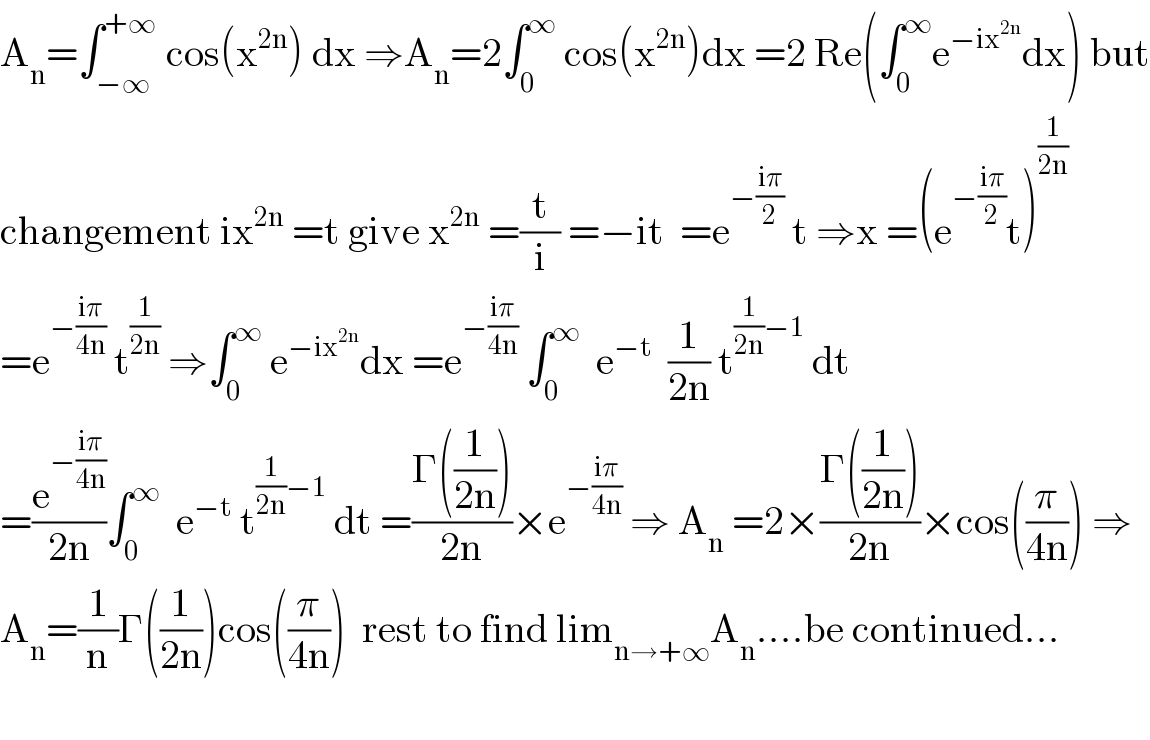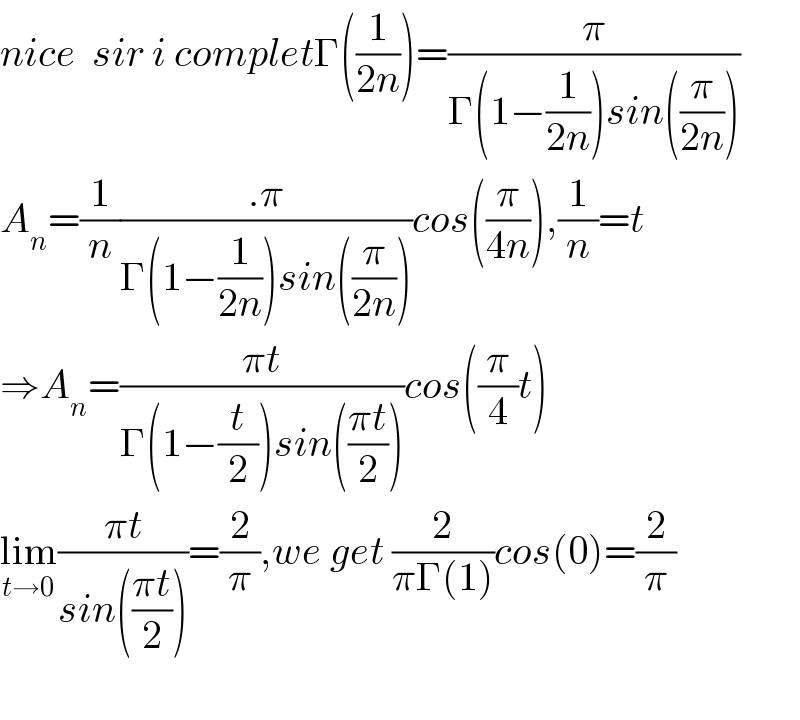Question Number 100368 by bemath last updated on 26/Jun/20

$$\underset{\mathrm{n}\rightarrow\infty} {\mathrm{lim}}\int_{−\infty} ^{\infty} \mathrm{cos}\:\left({x}^{{n}} \right)\:{dx}\:=? \\ $$$${where}\:{n}=\mathrm{2}{k},\:{k}\in\mathbb{N},\:{k}\neq\mathrm{0} \\ $$
Answered by mathmax by abdo last updated on 26/Jun/20

$$\mathrm{A}_{\mathrm{n}} =\int_{−\infty} ^{+\infty} \:\mathrm{cos}\left(\mathrm{x}^{\mathrm{2n}} \right)\:\mathrm{dx}\:\Rightarrow\mathrm{A}_{\mathrm{n}} =\mathrm{2}\int_{\mathrm{0}} ^{\infty} \:\mathrm{cos}\left(\mathrm{x}^{\mathrm{2n}} \right)\mathrm{dx}\:=\mathrm{2}\:\mathrm{Re}\left(\int_{\mathrm{0}} ^{\infty} \mathrm{e}^{−\mathrm{ix}^{\mathrm{2n}} } \mathrm{dx}\right)\:\mathrm{but} \\ $$$$\mathrm{changement}\:\mathrm{ix}^{\mathrm{2n}} \:=\mathrm{t}\:\mathrm{give}\:\mathrm{x}^{\mathrm{2n}} \:=\frac{\mathrm{t}}{\mathrm{i}}\:=−\mathrm{it}\:\:=\mathrm{e}^{−\frac{\mathrm{i}\pi}{\mathrm{2}}} \:\mathrm{t}\:\Rightarrow\mathrm{x}\:=\left(\mathrm{e}^{−\frac{\mathrm{i}\pi}{\mathrm{2}}} \mathrm{t}\right)^{\frac{\mathrm{1}}{\mathrm{2n}}} \\ $$$$=\mathrm{e}^{−\frac{\mathrm{i}\pi}{\mathrm{4n}}} \:\mathrm{t}^{\frac{\mathrm{1}}{\mathrm{2n}}} \:\Rightarrow\int_{\mathrm{0}} ^{\infty} \:\mathrm{e}^{−\mathrm{ix}^{\mathrm{2n}} } \mathrm{dx}\:=\mathrm{e}^{−\frac{\mathrm{i}\pi}{\mathrm{4n}}} \:\int_{\mathrm{0}} ^{\infty} \:\:\mathrm{e}^{−\mathrm{t}} \:\:\frac{\mathrm{1}}{\mathrm{2n}}\:\mathrm{t}^{\frac{\mathrm{1}}{\mathrm{2n}}−\mathrm{1}} \:\mathrm{dt} \\ $$$$=\frac{\mathrm{e}^{−\frac{\mathrm{i}\pi}{\mathrm{4n}}} }{\mathrm{2n}}\int_{\mathrm{0}} ^{\infty} \:\:\mathrm{e}^{−\mathrm{t}} \:\mathrm{t}^{\frac{\mathrm{1}}{\mathrm{2n}}−\mathrm{1}} \:\mathrm{dt}\:=\frac{\Gamma\left(\frac{\mathrm{1}}{\mathrm{2n}}\right)}{\mathrm{2n}}×\mathrm{e}^{−\frac{\mathrm{i}\pi}{\mathrm{4n}}} \:\Rightarrow\:\mathrm{A}_{\mathrm{n}} \:=\mathrm{2}×\frac{\Gamma\left(\frac{\mathrm{1}}{\mathrm{2n}}\right)}{\mathrm{2n}}×\mathrm{cos}\left(\frac{\pi}{\mathrm{4n}}\right)\:\Rightarrow \\ $$$$\mathrm{A}_{\mathrm{n}} =\frac{\mathrm{1}}{\mathrm{n}}\Gamma\left(\frac{\mathrm{1}}{\mathrm{2n}}\right)\mathrm{cos}\left(\frac{\pi}{\mathrm{4n}}\right)\:\:\mathrm{rest}\:\mathrm{to}\:\mathrm{find}\:\mathrm{lim}_{\mathrm{n}\rightarrow+\infty} \mathrm{A}_{\mathrm{n}} ….\mathrm{be}\:\mathrm{continued}… \\ $$$$ \\ $$
Commented by mathmax by abdo last updated on 26/Jun/20

$$\mathrm{thnk}\:\mathrm{you}\:\mathrm{sir}. \\ $$
Commented by Ar Brandon last updated on 26/Jun/20
wow, cool !
Commented by maths mind last updated on 26/Jun/20

$${nice}\:\:{sir}\:{i}\:{complet}\Gamma\left(\frac{\mathrm{1}}{\mathrm{2}{n}}\right)=\frac{\pi}{\Gamma\left(\mathrm{1}−\frac{\mathrm{1}}{\mathrm{2}{n}}\right){sin}\left(\frac{\pi}{\mathrm{2}{n}}\right)} \\ $$$${A}_{{n}} =\frac{\mathrm{1}}{{n}}\frac{.\pi}{\Gamma\left(\mathrm{1}−\frac{\mathrm{1}}{\mathrm{2}{n}}\right){sin}\left(\frac{\pi}{\mathrm{2}{n}}\right)}{cos}\left(\frac{\pi}{\mathrm{4}{n}}\right),\frac{\mathrm{1}}{{n}}={t} \\ $$$$\Rightarrow{A}_{{n}} =\frac{\pi{t}}{\Gamma\left(\mathrm{1}−\frac{{t}}{\mathrm{2}}\right){sin}\left(\frac{\pi{t}}{\mathrm{2}}\right)}{cos}\left(\frac{\pi}{\mathrm{4}}{t}\right) \\ $$$$\underset{{t}\rightarrow\mathrm{0}} {\mathrm{lim}}\frac{\pi{t}}{{sin}\left(\frac{\pi{t}}{\mathrm{2}}\right)}=\frac{\mathrm{2}}{\pi},{we}\:{get}\:\frac{\mathrm{2}}{\pi\Gamma\left(\mathrm{1}\right)}{cos}\left(\mathrm{0}\right)=\frac{\mathrm{2}}{\pi} \\ $$$$ \\ $$
Commented by Ar Brandon last updated on 27/Jun/20
Are you talking to yourself, Sir ?��
Commented by mathmax by abdo last updated on 27/Jun/20

$$\mathrm{i}\:\mathrm{talk}\:\mathrm{to}\:\mathrm{sir}\:\mathrm{mind}\:\mathrm{what}\:\mathrm{happen}\:\mathrm{to}\:\mathrm{you}… \\ $$
Commented by Ar Brandon last updated on 27/Jun/20
Oh sorry ! �� I just feel you both are alike. ����
Commented by maths mind last updated on 27/Jun/20

$${withe}\:{pleasur}\:{sir} \\ $$
